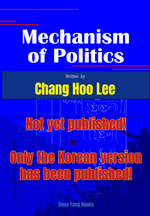| |
Chapter 2. Theoretical Foundation
of Political Phenomena
A. Theory of Politics as War Continuation
b. Meaning of the War Continuation
Theory

Politics is a continuation of war,
but canonical politics is a war that has been modified
to restrain violence. In war, you shoot guns and swing
swords at the enemy, but in canonical politics, you
form political parties, participate in legislative
activities, establish laws, vote, and debate. However,
no matter how large the difference may be, politics
and war are not separate; they are one piece connected
like both ends of a single stick.
This relationship between war and
politics can be represented in the following diagram.

The above [Diag.2.A.2] demonstrates
the logical continuity between war and politics. When
politics is considered as a continuation of war, politics
and war become essentially the same, so to distinguish
the two ends of the whole, "violent war"
and "canonical politics" are contrasted.
This means that war is performed in a very gentle
and soft manner in canonical politics, while canonical
politics is performed in a very extreme and violent
manner in violent war.
When viewed in this way, it is not
strange that struggle and slaughter, deceit and defamation
are rampant in legislative or political party activities.
In actuality, the behavior of canonical politics,
which are almost indistinguishable from war activities,
has always repeated through East-West conflict. The
established order in ancient Rome can be seen as being
in the middle of war violence and canonical politics,
meaning that canonical politics itself is stained
with military violence. For example, Galba who became
emperor in 68 AD rose to power through a military
rebellion against the former emperor Nero (54-68 AD)
and lost his life in the rebellion that later appointed
Marcius Salvius Otho (69 AD), and Otho lost his life
in a rebellion by the German army within a year. His
successor, Vitellius, was also the same. In the Middle
East and Asia, three out of the four Caliphs invited
after the death of the prophet Mohammed were killed
by assassins. In Thai politics from 1932 to 1991,
military coups occurred on average once every 3 years
and 5 months for a total of 17 times over 59 years,
making military coups a common means of regime change.
Political activities, including war activities, were
no different from each other. In comparison, political
apathy and disgust caused by the negative behavior
of politicians, such as the horse trading of lawmakers,
fist fighting in the parliament, black propaganda
in elections, and criticism, were actually less violent
and more normative than other political activities.
All of these are rooted in the political phenomenon
and have been repeating until now and will continue
to occur in the future.
Instruction of War Continuation Theory
Many people do not want to accept
the perspective that a peaceful era is a continuation
of a violent war. Therefore, some scholars emphasize
economic capabilities rather than removing armed forces
from the original elements of state formation. In
my opinion, the reason for this is not logical but
emotional. People do not want to think that all aspects
of life are a part of war. If one adopts such a position,
the world will seem even more unhappy.
However, it is not right to turn
a blind eye to the fact that a child gets hurt when
they fall off a big truck just because it is pitiful,
but rather we should find such dangerous situations.
It is more important to reduce the world's misfortunes,
not just how the world "appears." Then,
it is good for us to accept the war continuation theory
and the war transformation theory as reality. Otherwise,
the misfortune we experienced, such as the period
of Japanese imperialism, will repeat.
Kim Ok-gyun, Park Young-hyo, Seo
Jae-pil and other progressive activists attempted
to curb the conservative, feudal forces of Joseon
and reform politics, but they did not realize that
politics was fundamentally a continuation of war and
hoped that Japan would support their political beliefs
with good intentions. This was not just an individual
problem, but at the time, the foundation of political
education in Joseon was that one must not lose their
"comportment" even if they die, which was
a false sense of dignity. Therefore, the leaders of
that time believed that it was necessary to respond
with moral justice through psychological restraint
and ethical values rather than violence. The result
was nothing more than being overwhelmed by political
power.
It is not necessarily true that accepting
the theory of war continuation leads to the conclusion
of going to war unconditionally. In fact, "surprisingly,
as the level of armament increased, the number of
deaths decreased," and rulers restrained from
war to avoid hostile power conflicts, narrowed the
targets of attack, and made careful decisions about
the use of force. The usefulness of the war continuation
theory can be found here. The war continuation theory
restrains war.
Do you think that in politics, things
like proper political ideologies, culture, moral righteousness,
and economy are more important than war preparations?
500 years ago in the Western Roman Empire, there were
the Franks led by the barbarians along with the East
Goths and the West Goths. The East and West Goths
were relatively civilized powers, but the Franks were
cunning and bloodthirsty barbarians. However, the
power that later led politics was the Frank Kingdom
because it survived in the war regardless of the reason.
The Mongol Empire, established in AD 1206, rose to
become a world empire in a matter of days due to its
unparalleled conquest power in world history. The
reason was undoubtedly its strong military power,
not its economic power, cultural strength, or moral
legitimacy.
<Every footnote was
deleted from the book>
  
|